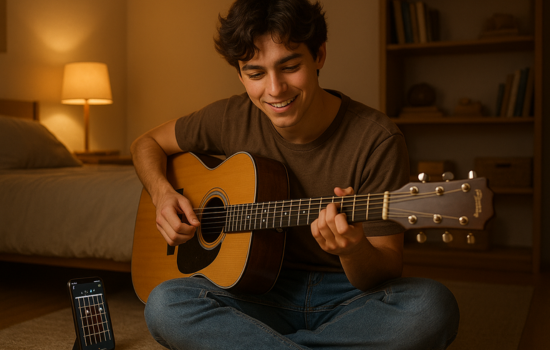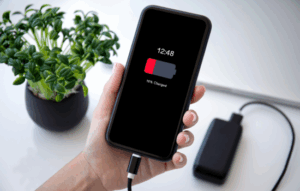Advertisements
Your perseverance is worth more than your natural talent
Learning to play the violin isn't a matter of talent, but rather perseverance. What truly transforms a beginner into a musician is the discipline of practicing every day, even if it's just a little bit.
If you've already taken the first step, congratulations! Now it's time to keep up the momentum, because with the help of the right apps, progress is at your fingertips.
Advertisements
How to organize a weekly routine with apps
Many people give up on guitar because they don't know how to structure their practice. Using apps can help you create a realistic and efficient routine, but you need to plan with intention. How do you do it?
First, determine how many days a week you can practice without stress. Ideally, start with 3 to 5 times a week, 15- to 30-minute sessions. You don't need hours—you need consistency.
Second, divide your time into chunks: 5 minutes of warm-up (finger exercises or simple chords), 15 minutes of guided lessons in the app, and 5 to 10 minutes playing a song you like. This way, you keep your learning balanced between technique and fun.
Advertisements
See also
- Fortifying tea: boost your little friend naturally
- Optimize your battery
- Your Voice and Your Stage: Karaoke Now!
- Monitor conversations: take care of those you love most
- Boost your confidence with habits that activate your little friend
Third, set small goals: master a new chord, play a simple song, improve your rhythm. Apps allow you to monitor this progress, and seeing your progress will keep you motivated.
And finally, choose a time of day that works for you. If you can repeat the practice at the same time (for example, right before dinner), your brain will form the habit more easily.
Remember: a good routine isn't rigid or exhausting. It's flexible, adaptable to your real life, and above all, sustainable. That's what will keep you moving forward.
Common mistakes that slow your progress (and how to avoid them)
Even the most enthusiastic learners can stumble. Sometimes, it's not a lack of desire, but simple mistakes that, without realizing it, sabotage the learning process. What are the most common ones?
1. Repeating unintentionally:
Practicing isn't the same as mechanical repetition. If you play the same chords over and over again without listening to your mistakes or applying corrections, it's like going in circles. Use the app's features to receive feedback and improve consciously.
2. Skip stages:
It's tempting to jump right into complex songs, but without a solid foundation, it leads to frustration. Resist the temptation to "rush." Rely on the app's structure: they'll guide you step by step.
3. Comparing yourself to others:
Seeing someone on social media playing like a pro can be discouraging. Remember that everyone has their own rhythm. Your progress shouldn't be measured by the talent of others, but by how far you've come since you started.
4. Not reviewing the basics:
Simple chords, correct posture, rhythm... all of these seem basic, but they're the pillars. Returning to them frequently helps you maintain your technique.
5. Ignoring rest:
Yes, even self-learning requires a break. Pushing your fingers or mind every day without a break can lead to fatigue and, in the worst case, to giving up.
Avoiding these mistakes allows you to move forward with less frustration. With apps that guide, correct, and motivate you, you already have the tools. You just need to use them wisely.
Tips to not give up and enjoy the process
Playing guitar is a journey, not a goal. And like any journey, it has ups and downs. The key is to enjoy the journey and not give up when obstacles appear. Here are some tips to keep moving forward with enthusiasm:
Celebrate micro-victories
Did you manage to make a clean chord? Did you play your first complete song, albeit slowly? That's worth celebrating. Recognizing these achievements keeps your motivation burning.
Use gamification to your advantage
Many apps include games, badges, and levels. Take part in these challenges. It seems like a game, but it's actually a technique in disguise. Learning while having fun is one of the best ways to advance without even realizing it.
Connect with the emotion
Play songs you love, songs that have meaning for you. That transforms practice into something emotional. It's not just technique, it's expression.
Record your progress
Every once in a while, record a video of yourself playing. A few weeks later, compare it with a new video. Seeing how much you've improved with your own eyes will give you the motivation to keep going.
Find a community
There are online groups, forums, and even app features for sharing progress. Connecting with others who are learning like you can provide encouragement and valuable advice.
The goal isn't to play perfectly, but to play with soul, with joy. With consistent practice and these simple tips, playing guitar will become a natural part of your day.

Transform your daily life with music as a habit
When music becomes part of your routine, something changes. You're not just learning an instrument: you're gaining confidence, focus, and creativity. Playing the violin with apps isn't just a hobby; it's an investment in your well-being.
You start playing a few chords, and without realizing it, you're transforming your stressful moments into musical pauses. Your house fills with melodies, your emotions find a creative outlet, and your self-esteem grows with each new step.
Consistency is a training, and music rewards you with every step. It doesn't matter if you're playing alone in your room. You're creating something. You're building a version of yourself that isn't afraid to learn, that doesn't give up, that finds joy in simplicity.
Don't underestimate the power of a daily habit. Learning to play the violin with apps can be the beginning of something much bigger: a lifelong relationship with music.





One Response